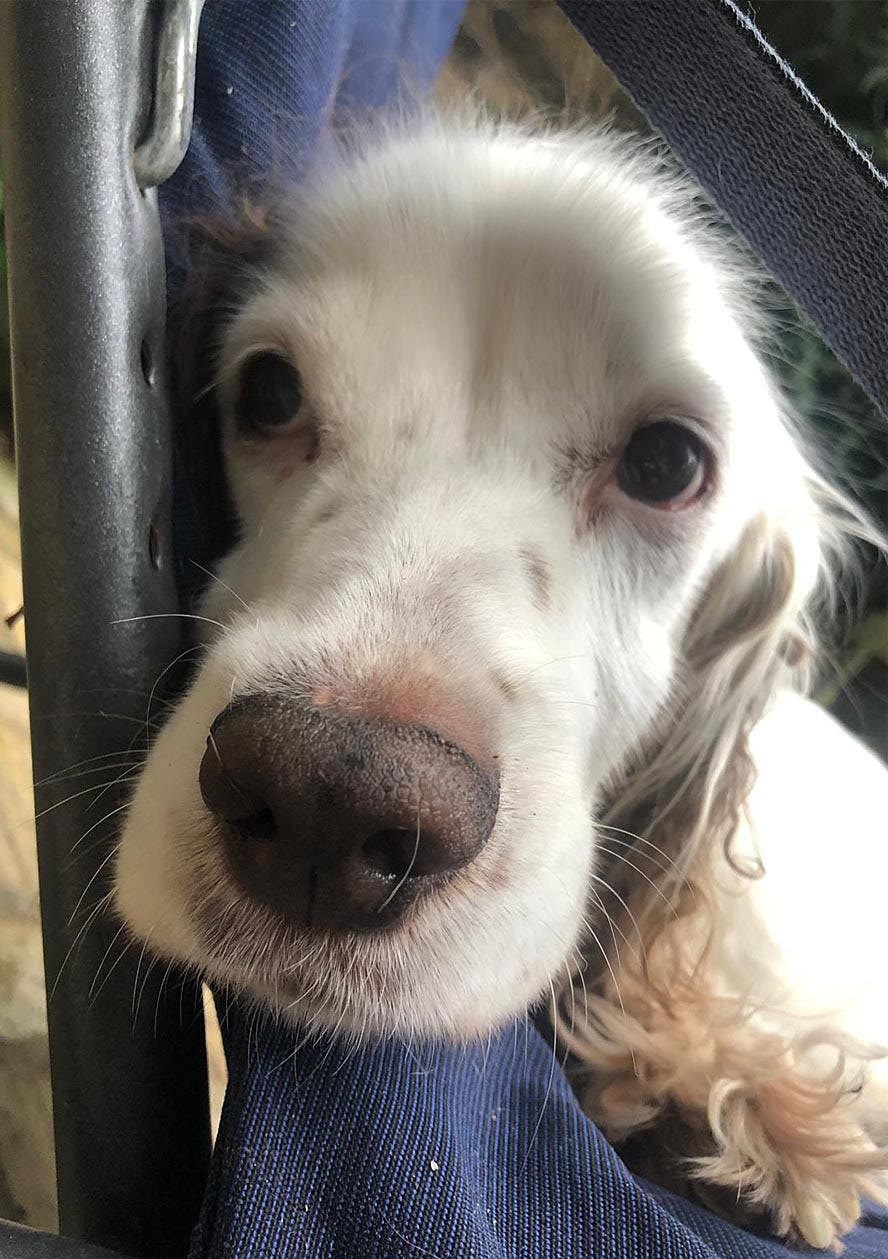Two weeks ago today, our beloved working cocker spaniel, Missie, died. It had already been quite a week: my wife’s birthday the day before (when we took the decision to ask the vet to come round the following day), and the death, just three days earlier, of my colleague and friend of 23 years, Gill, who had been diagnosed with an incurable brain tumour just last June. I will write something about Gill’s remarkable life here in due course, and I wouldn’t want anyone to think Missie’s death is in anyway comparable to Gill’s, who was just 69. It is some consolation, though, that Missie and Gill were the best of friends. Missie came to work with me pretty much every day of her life, and spent many of her working hours lying near Gill’s desk. Not that I’m a believer, but I can imagine the expression on each of their faces when Missie bounded into St Peter’s waiting room, and Gill spotted her from a little further up the queue.
Missie did incredibly well to survive well into her 16th year. The median life expectancy for small, female, long-nosed dogs (like Missie, who’s nose was her arguably her best feature - see below) is 13.3 years. But being part of the family for so long makes it so much harder now she’s gone. Apart from trips abroad, when she was looked after by the most fabulous dog boarder, there’s barely been a morning when we haven’t come downstairs to a delighted and enthusiastic greeting. And as someone whose brain chemistry is badly out of balance in the morning, you can imagine what a fillip she provided, day after day, year after year.
I know from the many wonderful dog owners I have befriended over the last 15 years that, like babies, everyone thinks theirs is the best. But it’s hard to imagine a dog with more character, a dog more able to make you laugh or, frankly, a dog more bonkers, than Missie. It certainly wasn’t all plain sailing. Puppy training classes (at a nearby scout hut with a highly polished floor) were a disaster. The trainer was great, but none of eight puppies were remotely interested in learning. We persevered to the point that things became manageable, but were never able to stop her pulling. In fact, there were only about two weeks, some time during her 14th year, when she stopped pulling of her own volition. Thenceforward she would stop every five yards or so for a good sniff and refuse to move until she was done.
And she had an exasperating habit that we were never able to cure: whenever anyone rang the doorbell, rather than attacking the caller, she would clamp her immensely powerful jaws onto the front door (now comprised of at least as much polyfilla as the original wood). And it wasn’t just the front door. Most of the doors at home, and also at work, show the scars of Missie’s failure to get past the oral stage. Some callers found it frightening, others hilarious, but it made it very difficult to hold a conversation, or to take a parcel from the postman. In later years, once we started having our groceries delivered, she switched her attention to the bags placed on the doormat. It’s remarkable how easily a canine molar can slice through all manner of grocery packaging. Even towards the very end, when she couldn’t always get up the stairs from her basement bed quickly enough, she would meet us half way up with predictable consequences.
But most of the time it was just lovely having her around. She loved her walks, and so did we. My wife and I calculate that between us, often together, we did a circuit of Greenwich Park with Missie around 5,000 times. She never bothered other dogs, she was great with children, seeming to sense the need to rein in her excitement so they could stroke her safely. As a youngster she was remarkably fast, once beating a whippet in the race for a ball. Her favourite pastime, though, was squirrel chasing. Thankfully, she never mastered the art of running and lunging at the same time so the park’s squirrel population remained constant, if better exercised than it might otherwise have been. The baffled look on her face, when, on arriving at a tree she would look behind it to see where her quarry had gone, will stay with me forever.
Fifteen years ago, when I finally caved to pressure from my wife and the kids to get a dog, I had no idea what a central part of my life she would become. During that time, and especially since the pandemic, the dog population has shot up. I only hope these legions of new dog owners and their pets get as much out of their relationships as we did with Missie. Much has been written about the unique bond between dogs and humans, and it’s true: there is, I think, a genuine connection between a dog and it’s owner(s), which I suspect doesn’t happen with any other species.
We were so lucky with Missie. She remained fit and healthy her entire life. Until a year ago, whenever people asked her age, and I would reply 14, they would invariably say ‘oh, 14 months’. Aided by her almost unique markings - I’ve met only one other spaniel with two white eyes - she solicited endless comments of ‘oh what a beautiful dog’. And she was.
This morning the vet phoned to say Missie’s ashes had come back from the crematorium and I duly went to collect her. Some of her we’ll scatter in our garden, and the rest at her favourite spot in the park. We like to think we gave her a good life. I only hope that somewhere beneath that rock hard skull of hers, there flickered some recognition of the joy and companionship she brought to ours.





